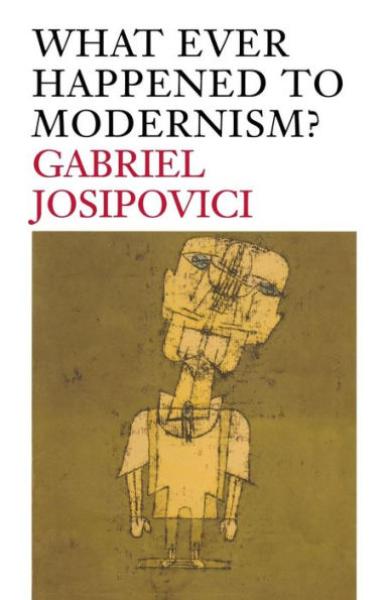Description
A personal, penetrating, and polemical account of what Modernism is and how contemporary literature has failed it
The quality of today's literary writing arouses the strongest opinions. For novelist and critic Gabriel Josipovici, the contemporary novel in English is profoundly disappointing--a poor relation of its groundbreaking Modernist forebears. This agile and passionate book asks why.
Modernism, Josipovici suggests, is only superficially a reaction to industrialization or a revolution in diction and form; essentially, it is art coming to consciousness of its own limits and responsibilities. And its origins are to be sought not in 1850 or 1800, but in the early 1500s, with the crisis of society and perception that also led to the rise of Protestantism. With sophistication and persuasiveness, Josipovici charts some of Modernism's key stages, from Dürer, Rabelais, and Cervantes to the present, bringing together a rich array of artists, musicians, and writers both familiar and unexpected--including Beckett, Borges, Friedrich, Cézanne, Stevens, Robbe-Grillet, Beethoven, and Wordsworth. He concludes with a stinging attack on the current literary scene in Britain and America, which raises questions about not only national taste, but contemporary culture itself.
Gabriel Josipovici has spent a lifetime writing, and writing about other writers. What Ever Happened to Modernism? is a strident call to arms, and a tour de force of literary, artistic, and philosophical explication that will stimulate anyone interested in art in the twentieth century and today.
The quality of today's literary writing arouses the strongest opinions. For novelist and critic Gabriel Josipovici, the contemporary novel in English is profoundly disappointing--a poor relation of its groundbreaking Modernist forebears. This agile and passionate book asks why. Modernism, Josipovici suggests, is only superficially a reaction to industrialization of a revolution in diction and form; essentially, it is art arriving at a consciousness of its own limits and responsibilities. And its origins are to be sought not in 1850 or even 1800, but in the early 1500s, with the crisis of society and perception that also led to the rise of Protestantism. With sophistication and persuasiveness, Josipovici charts some of Modernism's key stages, from D'urer, Rabelais, and Cervantes to the present, bringing together a rich array of artists, musicians, and writers both familiar and unexpected--including Beckett, Borges, Friedrich, Cezanne, Stevens, Robbe-Grillet, Beethoven, and Wordsworth. He concludes with a stinging attack on the current literary scene in Britain and America, which raises questions not only about national taste, but about contemporary culture itself. Gabriel Josipovici has spent a lifetime writing and writing about other writers. This book is a strident call to arms and a tour de force of literary, artistic, and philosophical explication that will stimulate anyone interested in art in the twentieth century and today.
"[A] small, elegant volume . . . Josipovici offers a refreshing retro-radicalism by rejecting the vetted reading list."--John L. Murphy, "New York"" Journal of Books"
--John L. Murphy "New York Journal of Books "
"[Josipovici''s] approach does more justice to the complexity of Modernism than any capsule account could provide. And because Mr. Josipovici is himself an accomplished novelist, he knows how to craft a strong narrative. . . . The story he tells is unexpectedly compelling."--Eric Ormsby, "Wall Street Journal"--Eric Ormsby "Wall Street Journal "
"An appealing literary-historical excursion .--M. A. Orthofer "Complete Review "
"An inspiring, sometimes electrifying, call to arms; a serious book for serious readers."--Ben Hamilton, "The Millions"--Ben Hamilton "The Millions "
"Valuable . . . . You don''t have to agree with all of Josipovici''s demanding ideas about what it means to write fiction after modernism to be stimulated and provoked by this book."--Bill Marx, "Arts Fuse"--Bill Marx "Arts Fuse "
"An appealing literary-historical excursion . . . Quite engaging."--;i>Complete Review
"--M. A. Orthofer "Complete Review "
Product Details
- Yale University Press Brand
- Oct 25, 2011 Pub Date:
- 030017800X ISBN-10:
- 9780300178005 ISBN-13:
- 224 Pages
- 8.49 in * 5.56 in * 0.69 in Dimensions:
- 1 lb Weight:




